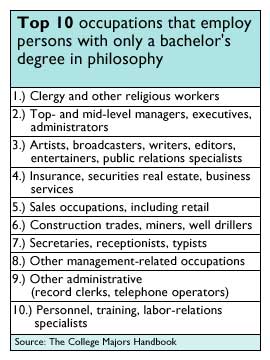|
"Working Your Degree"
|
 |
October 13, 2000: 7:20 a.m. ET
Most philosophy grads who don't go on to law school, work in unrelated fields
By Staff Writer Shelly K. Schwartz
|
NEW YORK (CNNfn) - Alex Pozdnyakov, a Manhattan resident and Russian-born immigrant, is a self-described "student of life."
The 1998 graduate of New York University (NYU) was studying his community and peers long before he selected philosophy as a major. It was the only way he knew how to bridge the cultural divide.
"I came to America when I was 14 and it was a very different world," he remembers. "I had to come up with some kind of logical system that I could use and apply to [this culture] so I could understand things that were foreign and the way other people think."
Now 25, Pozdnyakov works as a legal assistant for Skadden, Arps, Slate, Meagher & Flom in New York, helping out on corporate law cases involving mergers, acquisitions and other big-business activity. Like many of the philosophy students in his graduating class, he's also applying to law school this year.
"I have this strange phrase I use when people ask me why I chose philosophy," he said. "I tell them that I wanted to become a professional human being before becoming a professional. I thought philosophy would give me that and it did. It's going to be a very helpful skill in law, as well."
Religious pursuits
Philosophers study the root of fundamental beliefs, including the ideas and convictions of a group or individual.
More than half, 52 percent, of philosophy undergraduate majors eventually go on for a higher degree. Many, like Pozdnyakov, enroll in law school. Others go on for their Ph.D, which enables them to work in academia, either teaching or developing curricula.
A growing number, too, pursue a medical degree, insiders say.
"A bachelor's degree in philosophy is very good preparation for law school since the kinds of skills it teaches are quite closely related," said
Richard Bett, acting executive director of the American Philosophical  Association and a professor of philosophy at Johns Hopkins University. "Beyond that, there's no real recognized career track. It gives you a range of abilities that is quite unusual." Association and a professor of philosophy at Johns Hopkins University. "Beyond that, there's no real recognized career track. It gives you a range of abilities that is quite unusual."
Bett, echoing the comments of others in the field, notes that most philosophy grads post high scores in both the quantitative and verbal side of the GRE scores.
It's that kind of educational background, he said, that is coveted by the business community.
"There's no clear career path of continuation for the philosophy graduate and that's why we emphasize to them the versatility of the degree," said Paul Boghossian, philosophy professor and chairman of the department at NYU. "If they are capable of organizing their thoughts and expressing them in a clear and rigorous form, those are skills prized by many professions, including the financial world. It's a very adaptable degree."
Among those bachelor's degree holders who head straight into the work force, The College Majors Handbook, published by JIST Works, Inc., finds that just 36 percent accept jobs that are closely related to their field. The remaining 64 percent defect to higher-paying positions that are either somewhat related to their field of study, including administrative and managerial posts within religious or educational institutions, or not at all related.
Here's how the employment of undergraduate philosophy majors breaks down:
- About 30 percent work as members of the clergy and in other religious jobs in churches, synagogues, mosques and temples.
- Another 30 percent work in the private, for-profit sector called executive, administrative and managerial. Some 5 percent work as writers, editors, broadcasters and public relations specialists.
- And the rest are broken up among a range of unrelated occupations, including insurance, stocks and bonds, real estate, sales and business service occupations.
Interestingly, too, the Handbook finds that nearly 80 percent of employed philosophy graduates with only a bachelor's degree are males.
Visit CNNfn's Career page regularly to read "Working your Degree," a new column that highlights a different college major each week, focusing specifically on the job opportunities that exist. Or, click here for a list of previous columns on: physical education, accounting, architecture, biology, political science, English, engineering, economics, history, teaching, physical therapy and computer science professions.
If you're considering a career as a member of the clergy, for whatever religious denomination you choose, the Bureau of Labor Statistics reports in its latest Occupational Outlook survey that you can expect to work long hours. It also points out that many clergy members stay away from traditional congregation work and instead serve as chaplains for the Armed Forces, hospitals and social service agencies.
 Other data cited by the Handbook suggest the job market for clergy and other religious occupations is projected to grow some 20 percent over the next six years. Other data cited by the Handbook suggest the job market for clergy and other religious occupations is projected to grow some 20 percent over the next six years.
As for other occupations common to the philosophy grad, the BLS notes, those seeking a career in broadcasting should expect to struggle for employment, as the job market for announcers will decline through 2008. It might be wise to pursue a career in writing and editing instead, the job markets for which are projected to grow 21 percent to 35 percent during the same period.
Paycheck check-up
According to the Handbook, the average annual salary of philosophy graduates with a bachelor's degree is $38,200, that's 21 percent lower than the national average for all college grads.
That gap widens as philosophy grads remain in the work force. The average salary for philosophy  majors between ages 25 and 34, for example, is about $30,000. That climbs to about $35,500 between ages 35 and 40, and reaches a high for those in the 40 to 44 age bracket of $48,700. majors between ages 25 and 34, for example, is about $30,000. That climbs to about $35,500 between ages 35 and 40, and reaches a high for those in the 40 to 44 age bracket of $48,700.
It goes without saying that philosophy grads who find jobs in unrelated fields earn more than their counterparts who stuck with the traditional lines of work: $33,100 compared with $43,400, respectively.
And the Handbook goes on to reveal that bachelor's degree-level philosophy grads who land upper-level executive and administrative positions earn the most, at nearly $58,000 per year. That compares with those in the insurance, securities, real estate and business occupations, who earn about $54,000 per year.
Jobs in broadcasting, writing and public relations, which employ more female than male grads, pay closer to $48,000, according to the Handbook.
If you're interested in studying philosophy, Pozdnyakov said you should keep your mind open and try to specialize in an area that matches your interests.
"Philosophy gives different people different things," he said. "If you're interested in ethics, you go on to medical school. Others emphasize politics or logic. If you do well and you're well-rounded enough as a philosophy major, you'll do well [in the work force.]" 
|
|
|
|
|
 |

|

